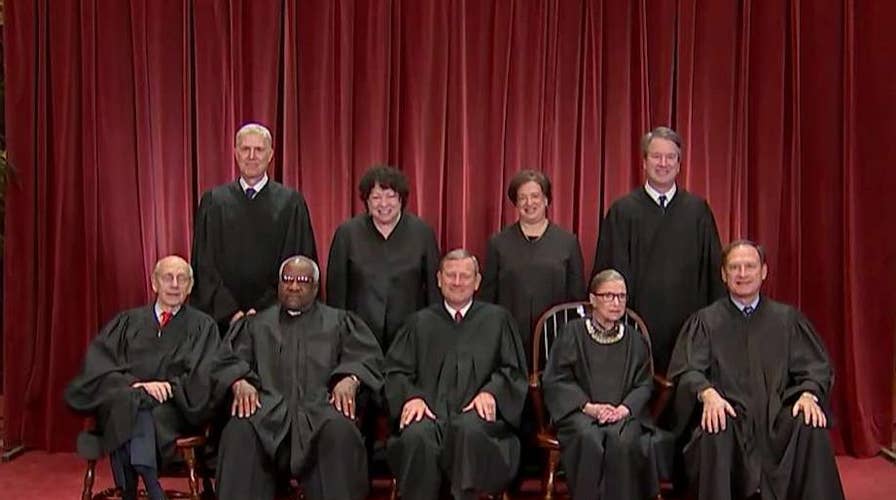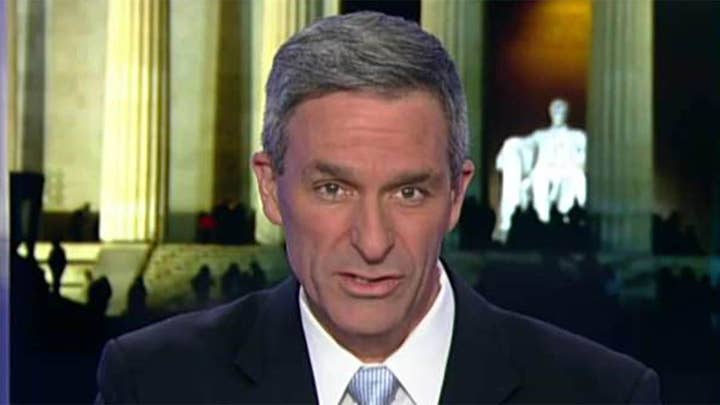Supreme Court's hot-button docket to be closely watched in 2020 election year
Correspondent David Spunt has a preview of the slate of big cases facing the high court in 2020.
The Justice Department on Tuesday filed an emergency request to the Supreme Court to lift injunctions on the administration’s “public charge" rule -- which would restrict green cards for immigrants deemed likely to be reliant on welfare.
The administration issued the rule in August that would define a “public charge” as an immigrant who received one or more designated welfare benefits for more than 12 months within a 36-month period.
COURT BLOCKS TRUMP PUSH TO RESTRICT GREEN CARDS FOR WELFARE-TAPPING IMMIGRANTS
While a standard of not admitting “public charges” to the U.S. has been part of immigration law for decades, it has never been formally defined in statute. Officials say it will protect taxpayers and make sure immigrants are self-sufficient.
The designated benefits include Supplemental Security Income (SSI) and Temporary Assistance for Needy Families (TANF), as well as most forms of Medicaid and the Supplemental Nutrition Assistance Program (SNAP), commonly known as food stamps. Usage of those benefits would be considered when an immigrant applies for permanent residency along with standard considerations such as age, health and financial assets.
But the controversial rule was blocked in nationwide injunctions by lower federal courts. The states of Connecticut, Vermont, and New York, as well as New York City and immigrant rights groups had sued over the rule. Opponents say the rule would have a chilling effect on immigrants and prevent them from getting the help they may need.
The DOJ wants the Supreme Court to allow the policy to be enforced temporarily until the issues are resolved on merits. The time-sensitive application goes first to Justice Ruth Bader Ginsburg, who will ask the states to respond to the government’s enforcement request. She will also likely ask her colleagues to weigh in before issuing an order in the coming days.
TRUMP TOUTS COURT RULING ALLOWING MILITARY FUNDS FOR BORDER WALL CONSTRUCTION
The Trump Justice Department repeatedly has gone to the Supreme Court to lift court-ordered injunctions, bypassing the traditional appellate process.
The public charge rule hit another roadblock last week when the Second Circuit Court of Appeals declined to lift an injunction imposed by a New York federal judge in October.
U.S. District Court Judge George Daniels in October ruled that the government failed to provide a reasonable explanation for changing the definition and objected to parts of it, including the inclusion of English proficiency as a sign of self-sufficiency, calling it a "new agency policy of exclusion in search of justification."
Legal and immigrant rights groups behind the push for the injunction issued a statement after the Supreme Court request, accusing the administration of trying to push what they described as a "racist wealth test" for immigrants.
"The Trump administration is grasping at straws in their desperate attempt to expedite implementation of their racist wealth test for immigrants even before the government’s appeals have been heard by the circuit courts. We hope that the Supreme Court sees this motion for what it truly is and immediately denies it," said the statement from groups including The Legal Aid Society and Make the Road New York.
"Now, more than ever, it is critical that the public charge policy, which the lower courts called ‘repugnant to the American Dream of prosperity and opportunity through hard work and upward mobility,’ continues to be blocked," it said.
Meanwhile, Democrats on the House Judiciary Committee on Tuesday announced that they would be investigating the program, calling it a "dangerously flawed policy" that puts asylum seekers at risk and "should be abandoned."
CLICK HERE TO GET THE FOX NEWS APP
U.S. Citizenship and Immigration Services, the agency responsible for the rule, has remained confident about its hopes for being found legal.
"The public charge inadmissibility rule enforces long-standing immigration law that Congress reaffirmed in 1996," a spokesperson told Fox News. "We are confident that an objective judiciary will see that this rule lies squarely within existing law."
Ginsburg, part of the court’s liberal wing, has ruled in favor of the Trump administration on emergency requests before. In December, she granted a request from President Trump’s lawyers to delay enforcement of subpoenas House Democrats issued to Deutsche Bank and Capital One for Trump’s bank records.
Fox News’ Shannon Bream, Marta Dhanis and Marisa Schultz contributed to this report.






